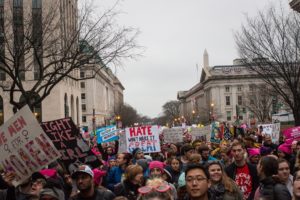Only 4 percent of Asian Americans and Pacific Islanders (AAPIs) voted in the 2016 presidential election.
The Atlantic called the community “mostly invisible in the American political debate.” On the other hand, prior to the election, the Huffington Post and the LA Times emphasized AAPIs’ potential in influencing the election, especially in battleground states.
While reading these articles, I immediately thought of an editorial from Pacific Ties, a University of California, Los Angeles newsmagazine I write for. The editorial criticized and responded to a story from The Quad, an opinion blog in the Daily Bruin, which presented AAPI organizations on campus as apolitical.
I put two and two together and came to the realization that today’s media outlets are similar to that story: Both overlooked and erased the years of political engagement by AAPIs. They focused too much on a few numbers and forgot the countless AAPI political organizations, leaders, protests, speeches and legal battles. Frankly, we have been actively engaged in politics and even more so today.
On April 29, 1992, following the acquittal of four police officers for the beating of Rodney King, riots ravaged South Central Los Angeles. The riots brought over $1 billion in property damage, of which $400 million affected Korean American shop owners in South Central and Koreatown. Rather than sitting still and remaining silent, thousands of Korean Americans banded together and marched through the streets of Los Angeles, protesting the violence.
Korean Americans at the same time began establishing many nonprofit organizations, working with other leaders and council members to address post-riot needs. Younger generations of Korean Americans stood up and became unofficial spokespeople for their community, voicing its concerns and needs to the rest of the nation.
 More recently, AAPIs literally took the center stage at the Women’s March in D.C. Organizations including the Asian American Legal Defense and Education Fund and prominent figures such as Constance Wu, actress from ABC’s Fresh of the Boat, marched and spoke at the event.
More recently, AAPIs literally took the center stage at the Women’s March in D.C. Organizations including the Asian American Legal Defense and Education Fund and prominent figures such as Constance Wu, actress from ABC’s Fresh of the Boat, marched and spoke at the event.
Sen. Tammy Duckworth (D-IL) one of the speakers, criticized President Donald Trump’s attitude toward people with disabilities and the potential in rolling back the Americans with Disabilities Act. The Thai American woman and Iraq veteran ended her speech encouraging others to fight for change by running for office in their local communities and in Congress.
Alongside Duckworth stood Rhea Suh and Amanda Nguyen, who both spoke as well. Suh, the president of the Natural Resources Defense Council, advocated for environmental conservation and antipollution measures in her speech. Nguyen, president of RISE, a nonprofit dedicated to sexual assault survivors’ rights, called for solidarity among survivors and promised to rewrite laws concerning sexual assault crimes. She additionally noted the recent passing of the Sexual Assault Survivors’ Bill of Rights, which was facilitated by her organization.
Currently, even as President Trump institutes divisive policies, AAPIs are active, rushing to the battlefront, poised to fight for and protect any of those affected.
Legal and civil rights nonprofit Asian Americans Advancing Justice | Los Angeles sent attorneys to airports throughout the country in response to the January travel ban. At San Francisco International airport, the attorneys successfully negotiated the release of an Iranian couple and helped in the lawsuits. AAAJ | LA proceeded to host workshops across Los Angeles County that inform immigrant workers of their rights and actions to take if they were to be detained.
After Trump declared the new travel ban on March 1, the nonprofit launched education campaigns in efforts to inform travelers of their rights. Attorneys from Hawaii, including Attorney General Doug Chin, filed a lawsuit, citing the ban as discriminatory. U.S. District Judge Derrick Watson, a native Hawaiian, granted a motion on March 15 to file a temporary restraining order on the ban, which would apply nationwide.
Identifying as Asian American, I feel my community has done much more than commit 4 percent. Sure we vote, but we also talk about politics at the dinner table and at work. We volunteer at nonprofits to bring more awareness to an issue or help elect leaders to office. When we feel our rights threatened, we make sure our voices are heard and effect change through legal routes. We are and have been very wary of the political landscape, and as time moves on, we will only become more involved in American politics.
AsAmNews has Asian America in its heart. We’re an all-volunteer effort of dedicated staff and interns. You can show your support by liking our Facebook page at www.facebook.com/asamnews, following us on Twitter,sharing our stories, interning or joining our staff.



RE: Why the apathetic Asian American is a Myth: The elite liberals don’t see the AAPI as “cause” they can get “hero kudos “